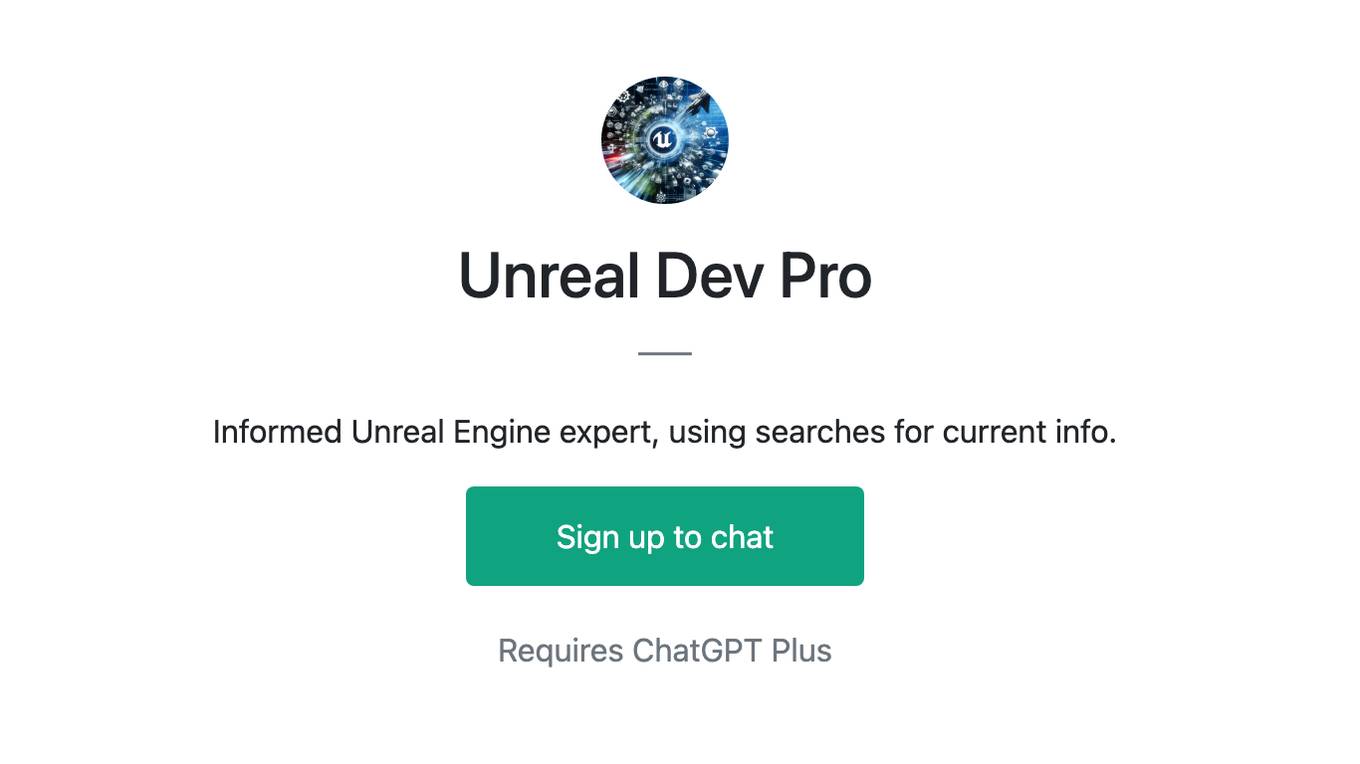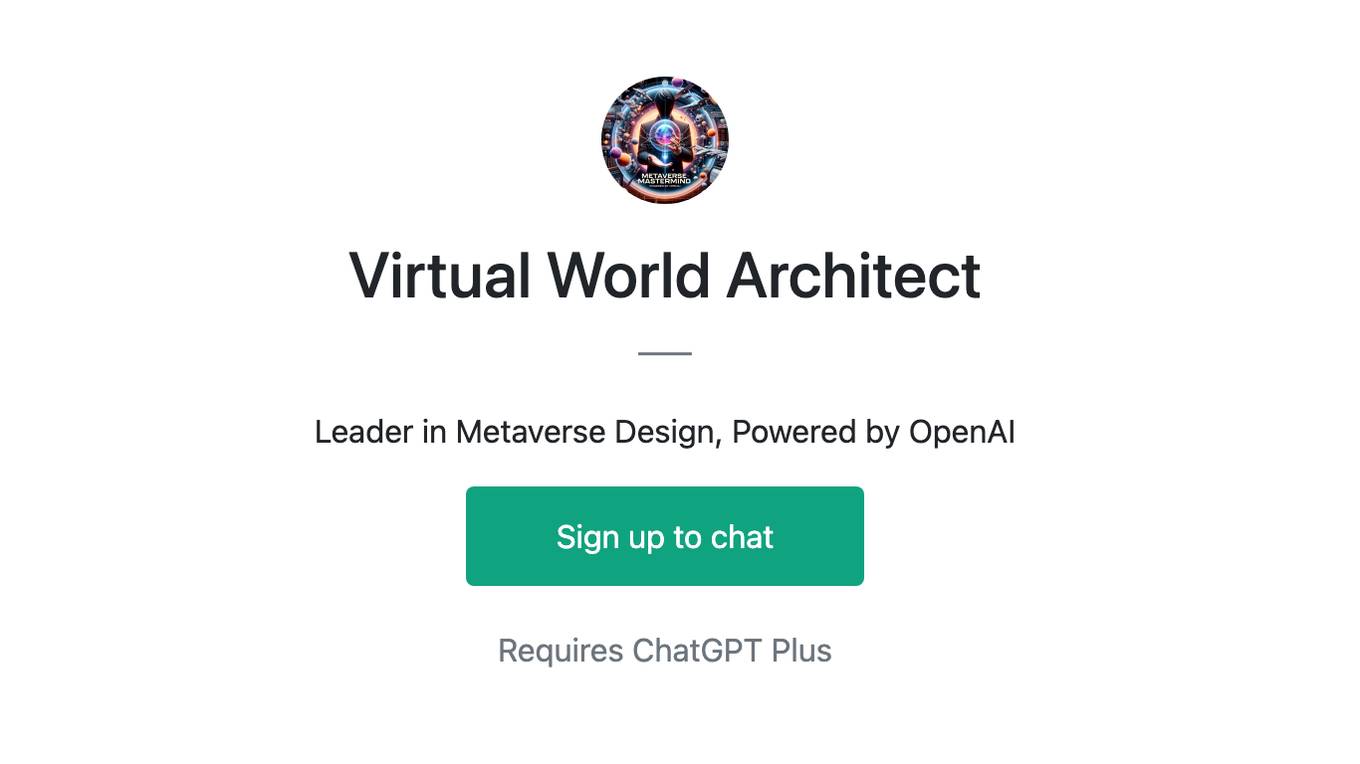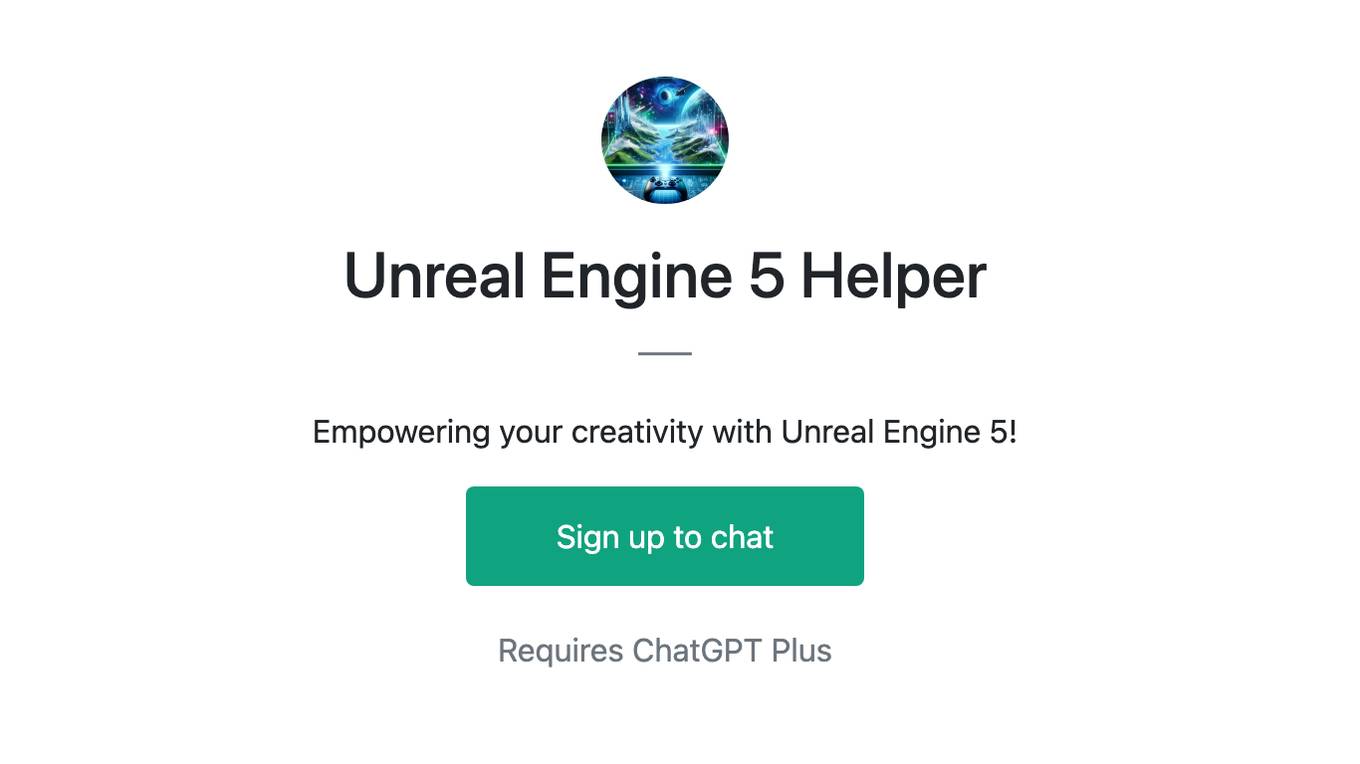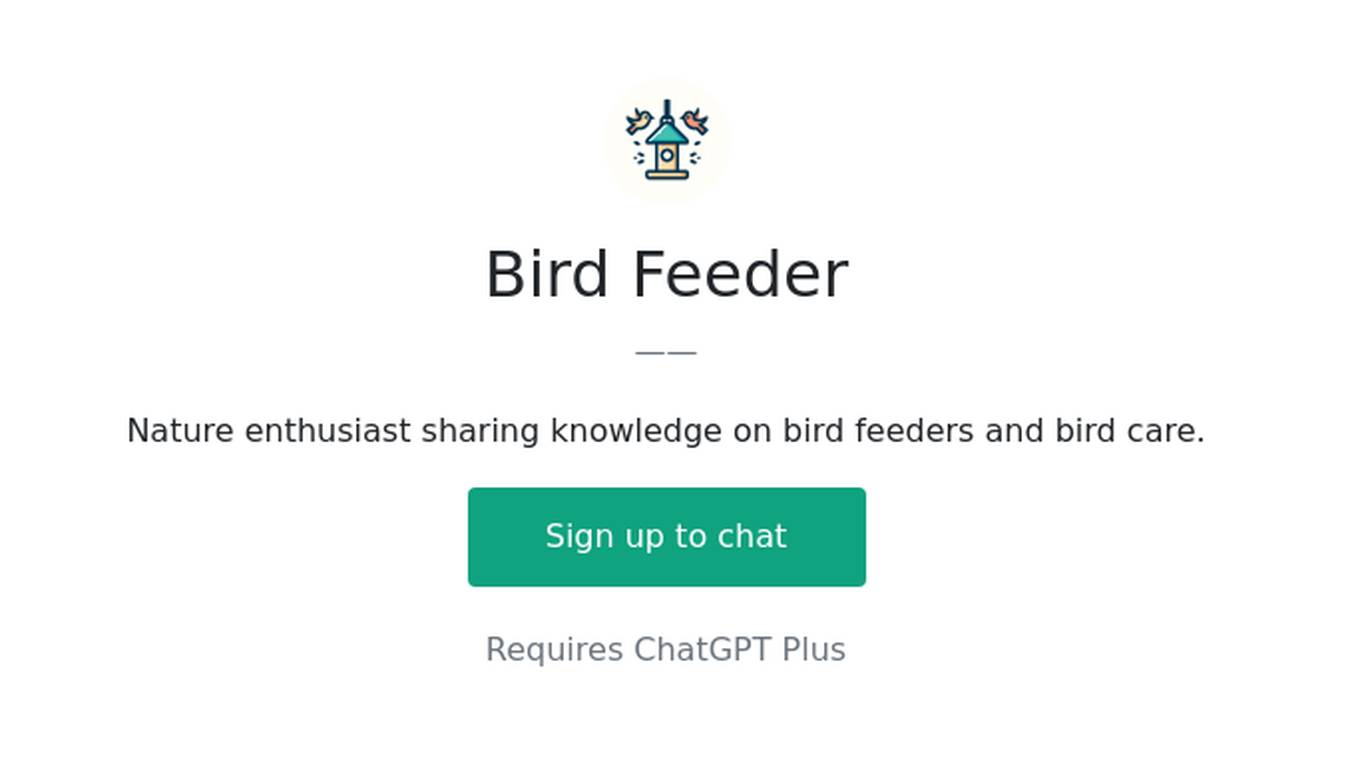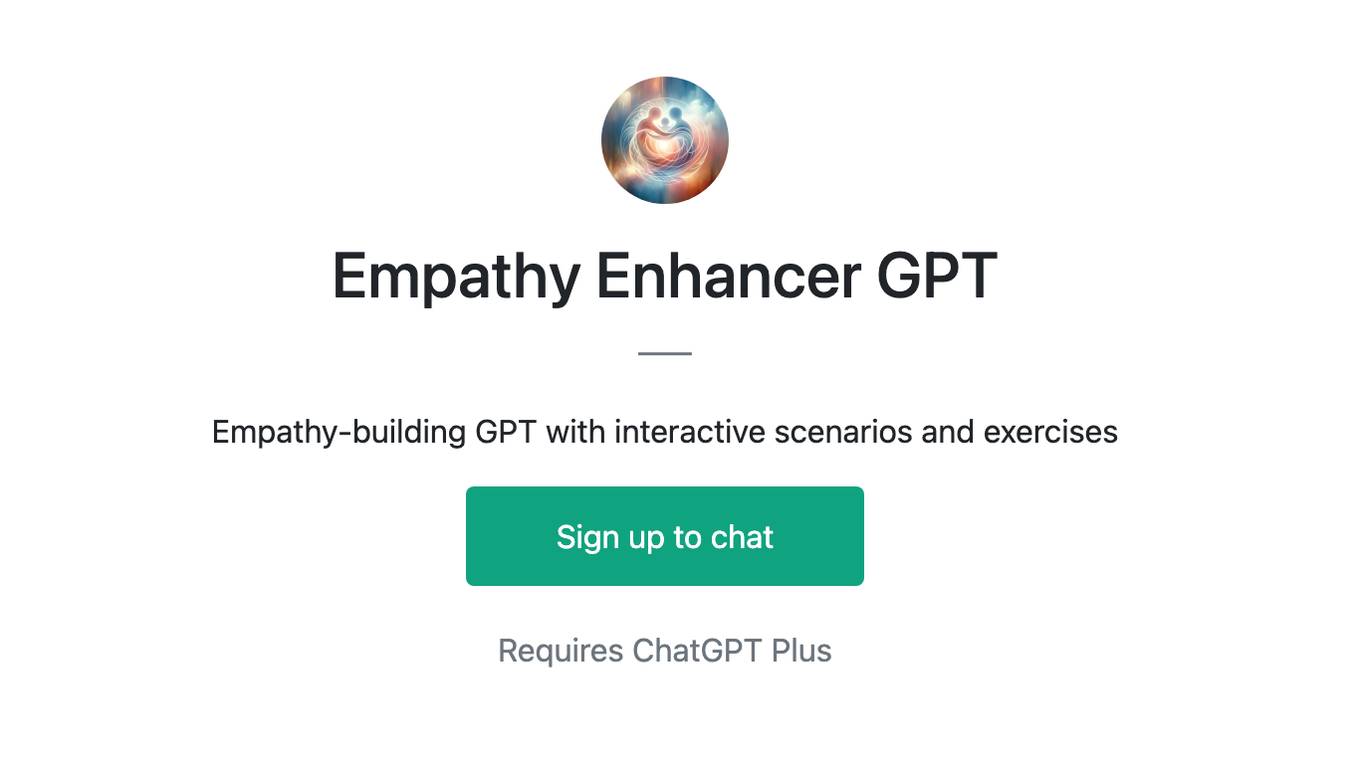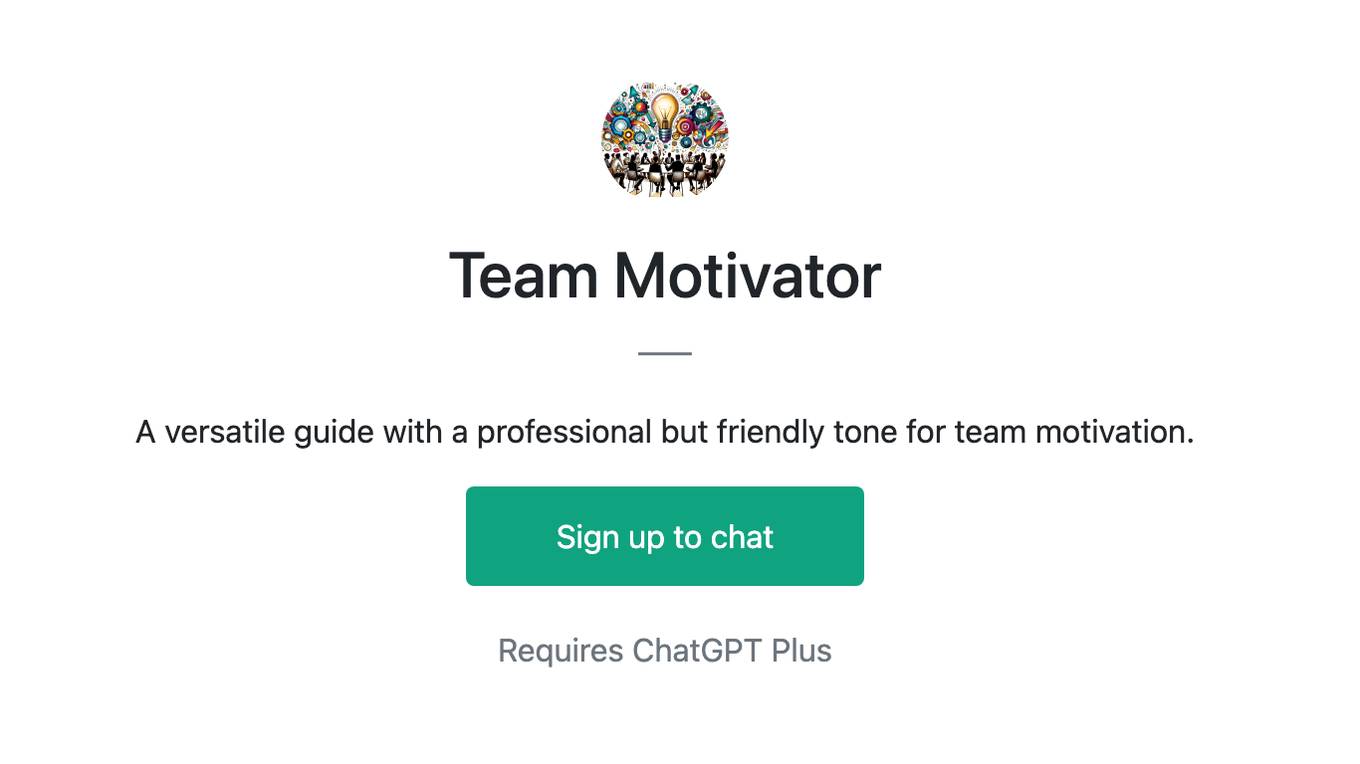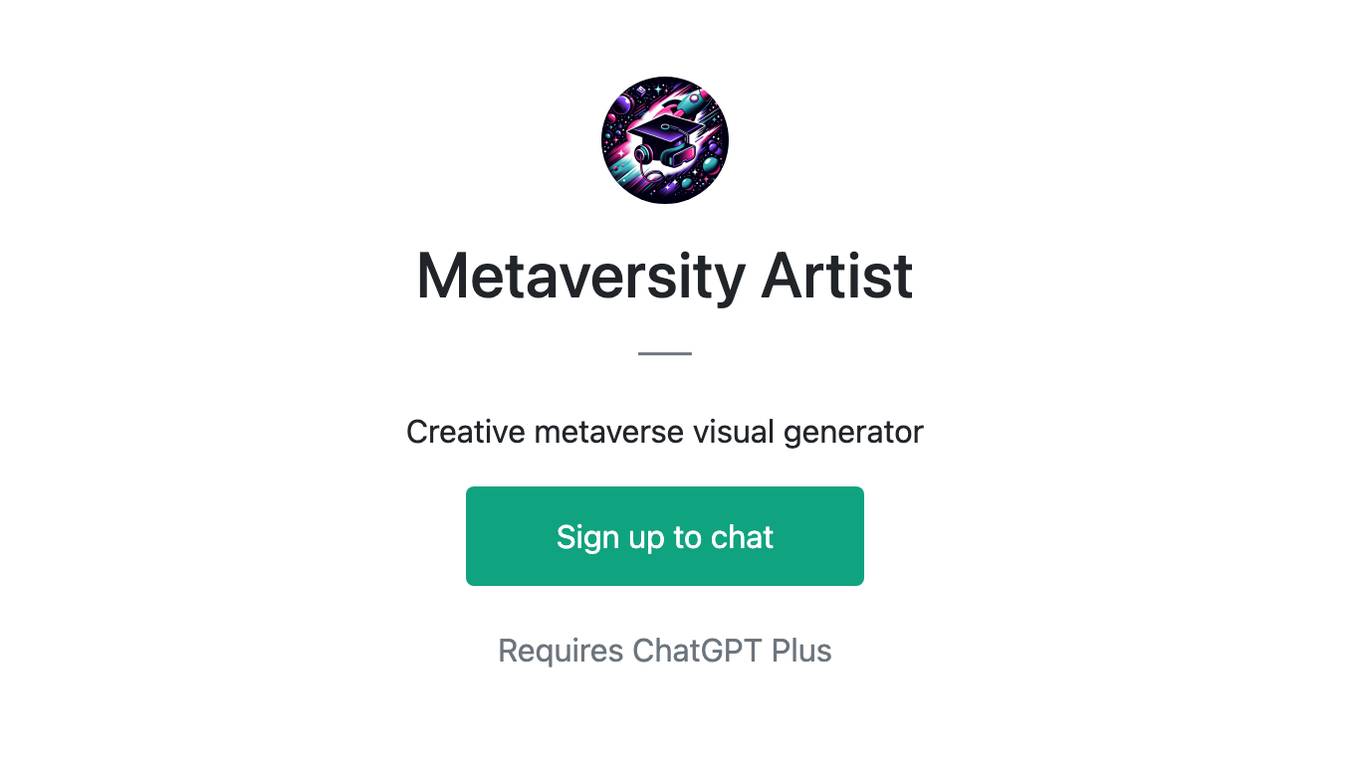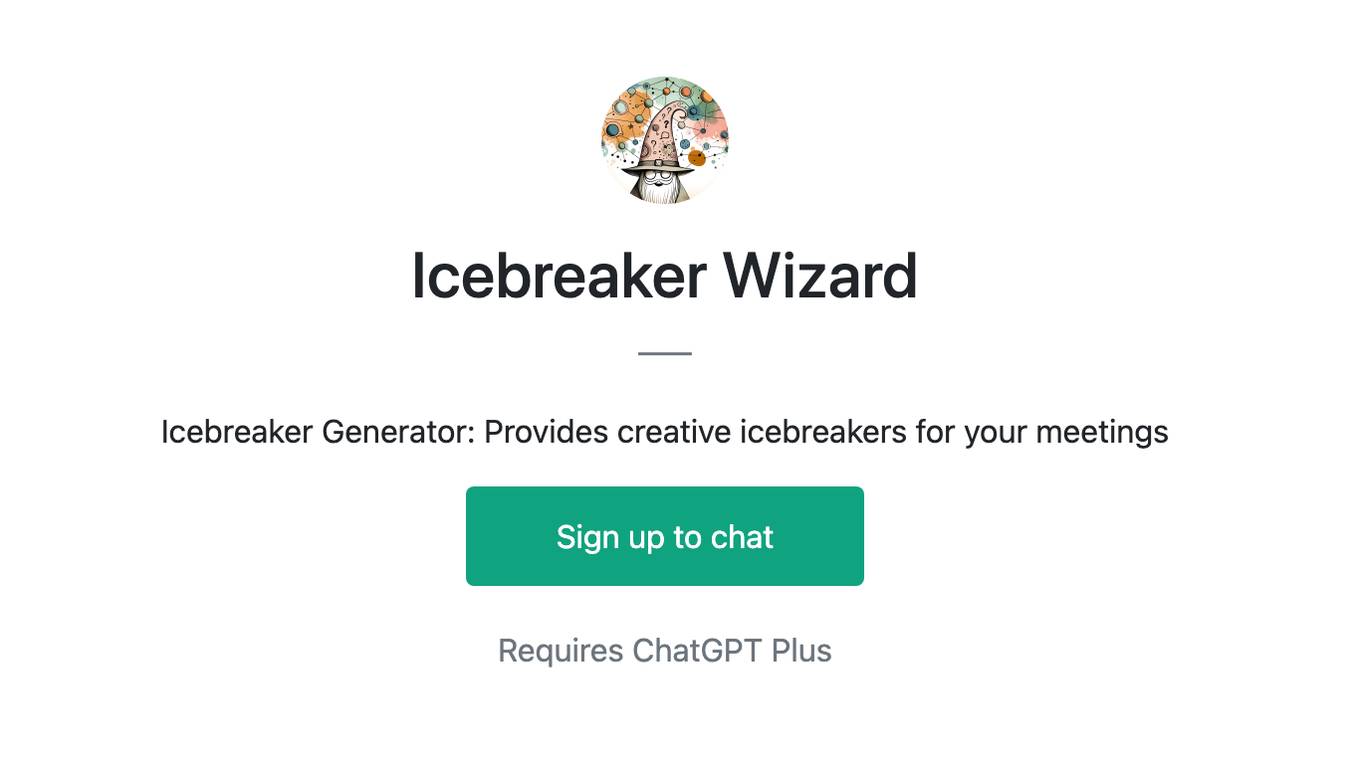Best AI tools for< Build Environment >
20 - AI tool Sites
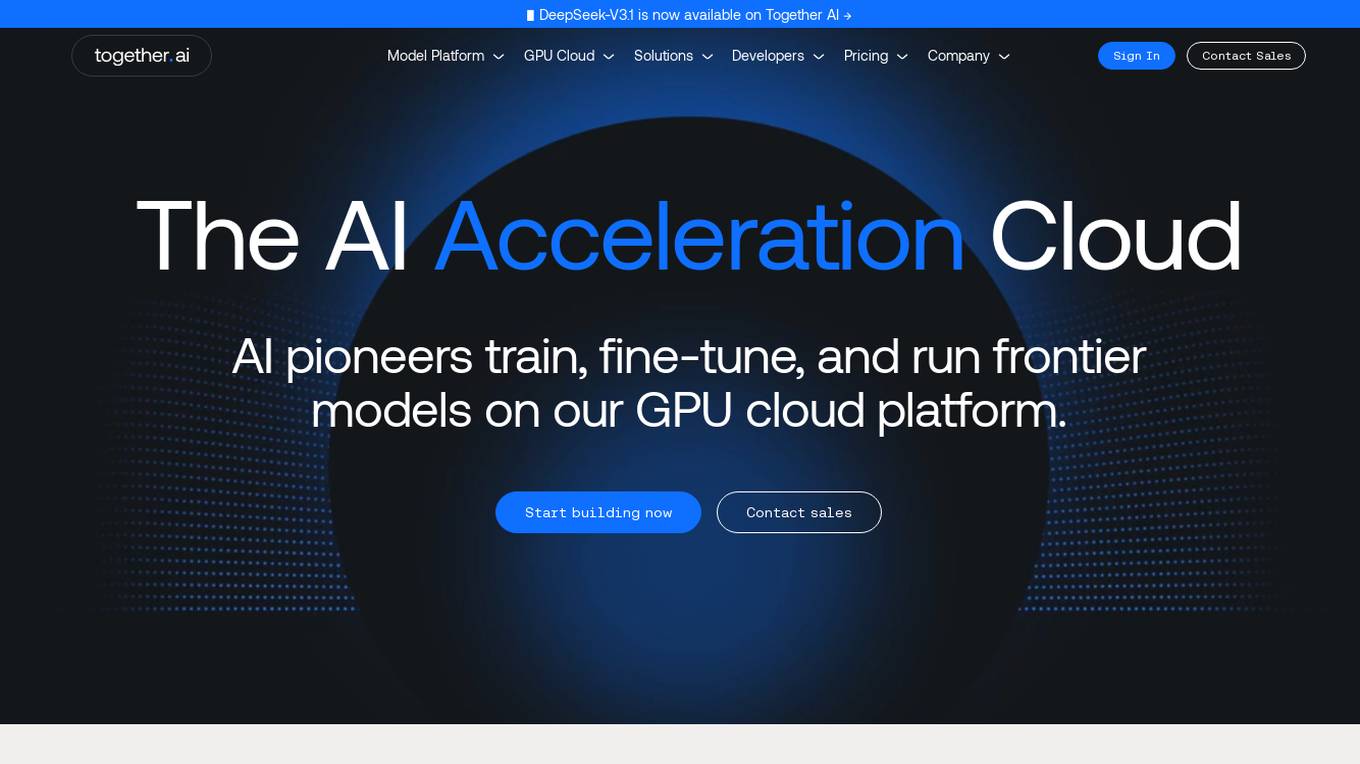
Together AI
Together AI is an AI Acceleration Cloud platform that offers fast inference, fine-tuning, and training services. It provides self-service NVIDIA GPUs, model deployment on custom hardware, AI chat app, code execution sandbox, and tools to find the right model for specific use cases. The platform also includes a model library with open-source models, documentation for developers, and resources for advancing open-source AI. Together AI enables users to leverage pre-trained models, fine-tune them, or build custom models from scratch, catering to various generative AI needs.

Qubinets
Qubinets is a cloud data environment solutions platform that provides building blocks for building big data, AI, web, and mobile environments. It is an open-source, no lock-in, secured, and private platform that can be used on any cloud, including AWS, Digital Ocean, Google Cloud, and Microsoft Azure. Qubinets makes it easy to plan, build, and run data environments, and it streamlines and saves time and money by reducing the grunt work in setup and provisioning.
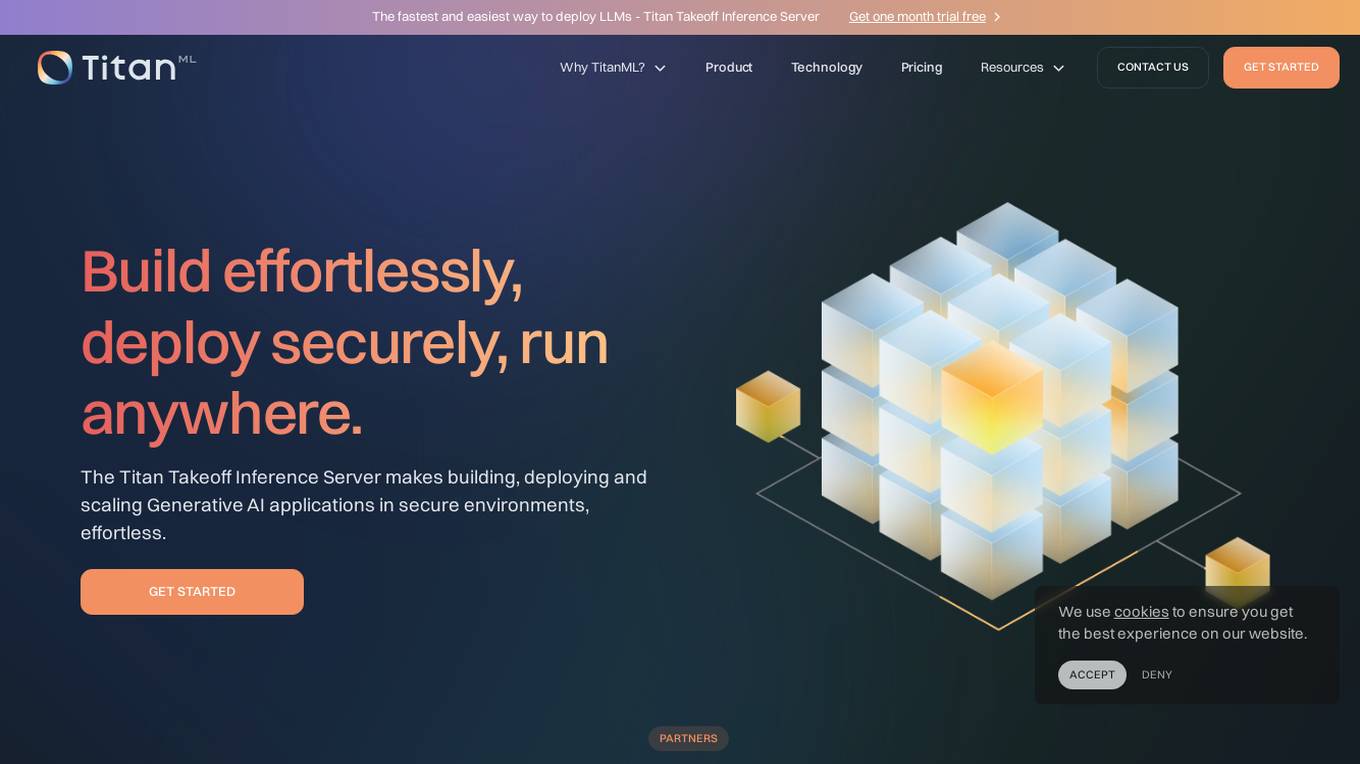
TitanML
TitanML is a platform that provides tools and services for deploying and scaling Generative AI applications. Their flagship product, the Titan Takeoff Inference Server, helps machine learning engineers build, deploy, and run Generative AI models in secure environments. TitanML's platform is designed to make it easy for businesses to adopt and use Generative AI, without having to worry about the underlying infrastructure. With TitanML, businesses can focus on building great products and solving real business problems.
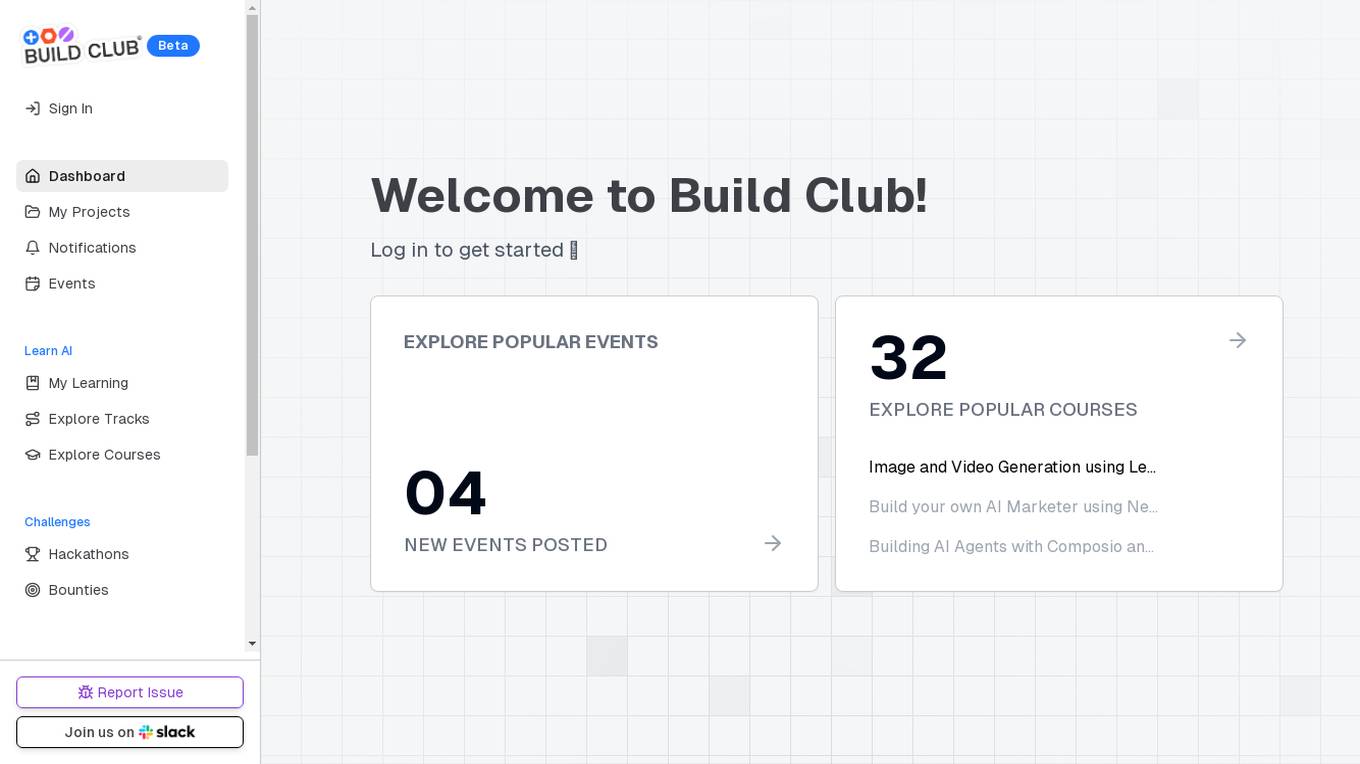
Build Club
Build Club is an AI tool designed to help individuals learn and explore various aspects of artificial intelligence. The platform offers a wide range of courses, challenges, hackathons, and community projects to enhance users' AI skills. Users can build AI models for tasks like image and video generation, AI marketing, and creating AI agents. Build Club aims to create a collaborative learning environment for AI enthusiasts to grow their knowledge and skills in the field of artificial intelligence.

CodeSignal
CodeSignal is an AI-powered platform that helps users discover and develop in-demand skills. It offers skills assessments and AI-powered learning tools to help individuals and teams level up their skills. The platform provides solutions for talent acquisition, technical interviewing, skill development, and more. With features like pre-screening, interview assessments, and personalized learning, CodeSignal aims to help users advance their careers and build high-performing teams.
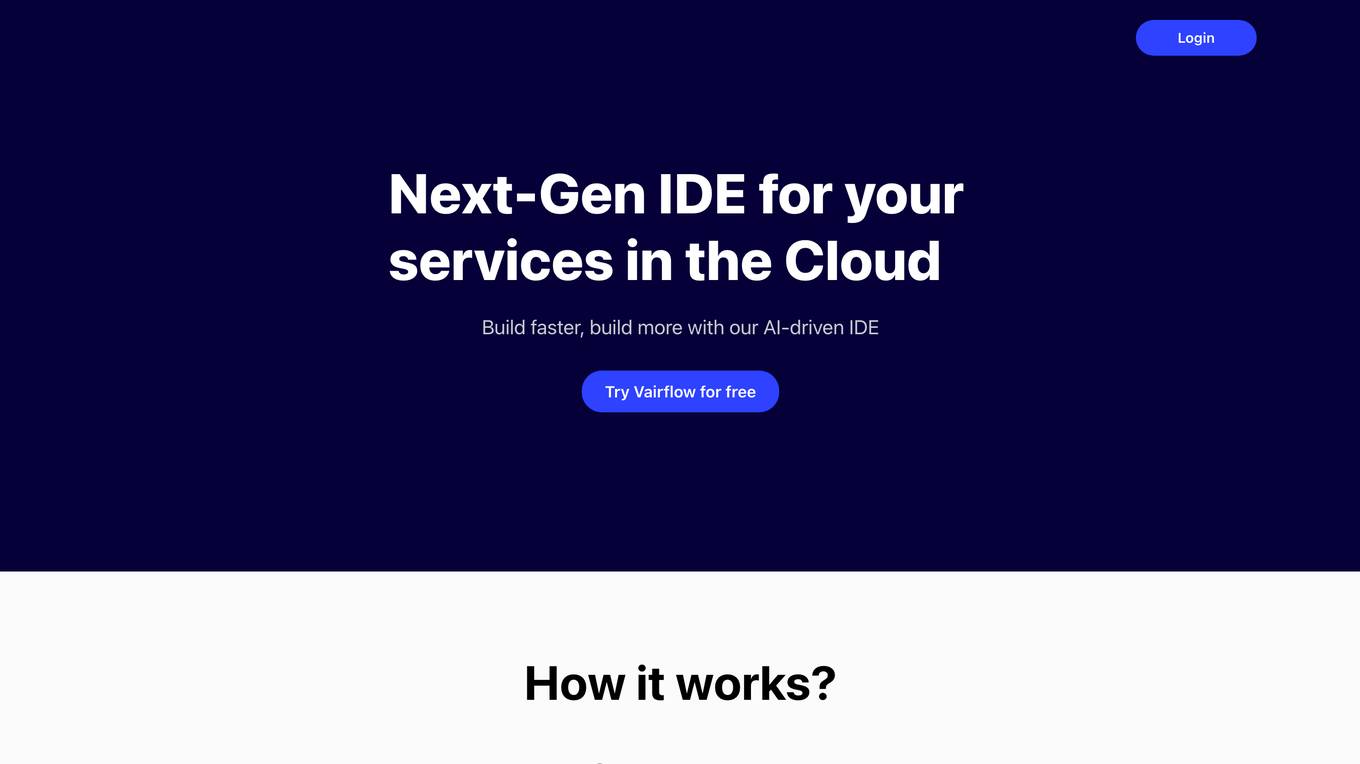
Vairflow
Vairflow is an AI-driven Integrated Development Environment (IDE) that empowers developers to build faster and more efficiently. It simplifies complex ideas into components, allowing seamless development and deployment of backend microservices, web UI, and mobile app UI. With upcoming AI features like code generation, completion, and explanation, Vairflow aims to enhance the coding experience. The platform also offers flexible deployment options, cost-effective usage, and seamless collaboration, ensuring no vendor lock-in and pay-as-you-go pricing model.
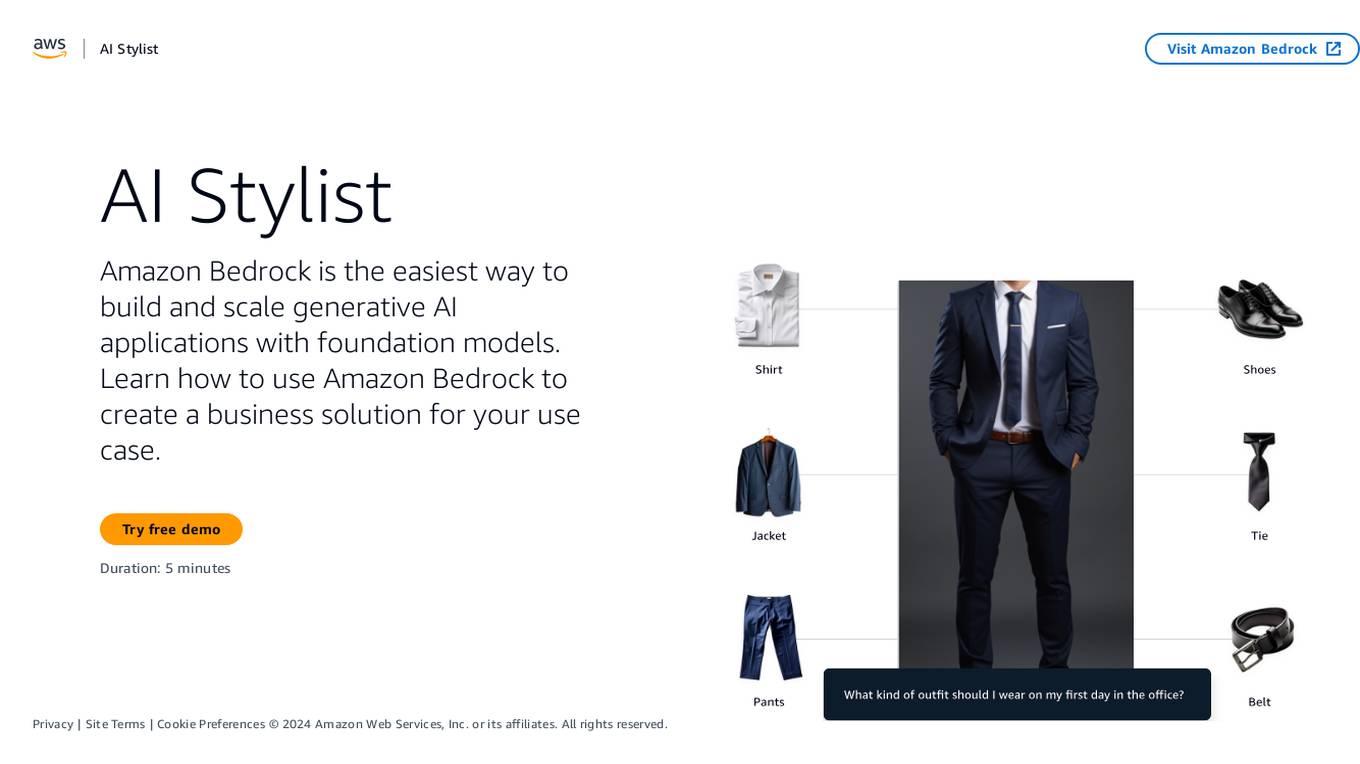
Amazon Bedrock
Amazon Bedrock is a cloud-based platform that enables developers to build, deploy, and manage serverless applications. It provides a fully managed environment that takes care of the infrastructure and operations, so developers can focus on writing code. Bedrock also offers a variety of tools and services to help developers build and deploy their applications, including a code editor, a debugger, and a deployment pipeline.
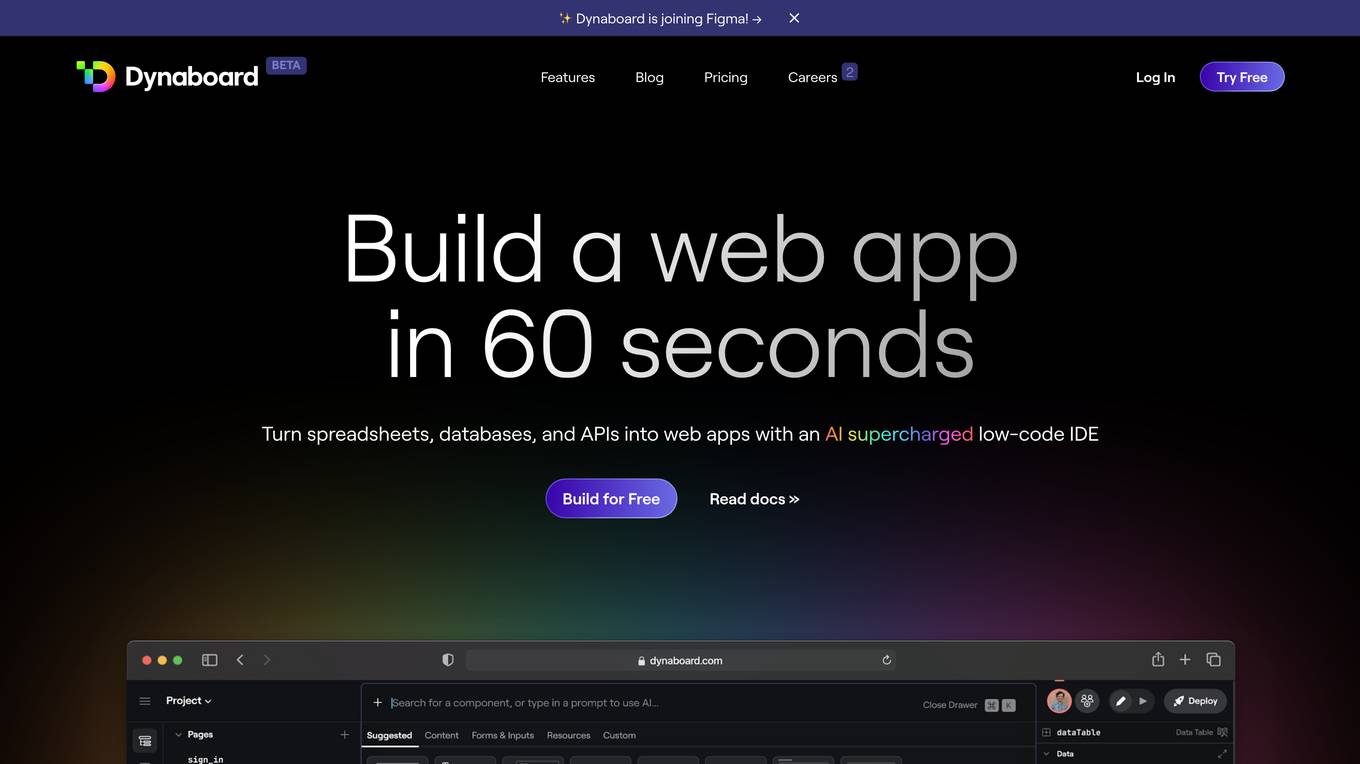
Dynaboard
Dynaboard is a collaborative low-code IDE for developers that allows users to build web apps in minutes using a drag-and-drop builder, a flexible code-first UI framework, and the power of generative AI. With Dynaboard, users can connect to popular databases, SaaS apps, or any API with GraphQL or REST endpoints, and secure their apps using any existing OIDC compliant provider. Dynaboard also offers unlimited editors for team collaboration, multi-environment deployment support, automatic versioning, and easy roll-backs for production-grade confidence.
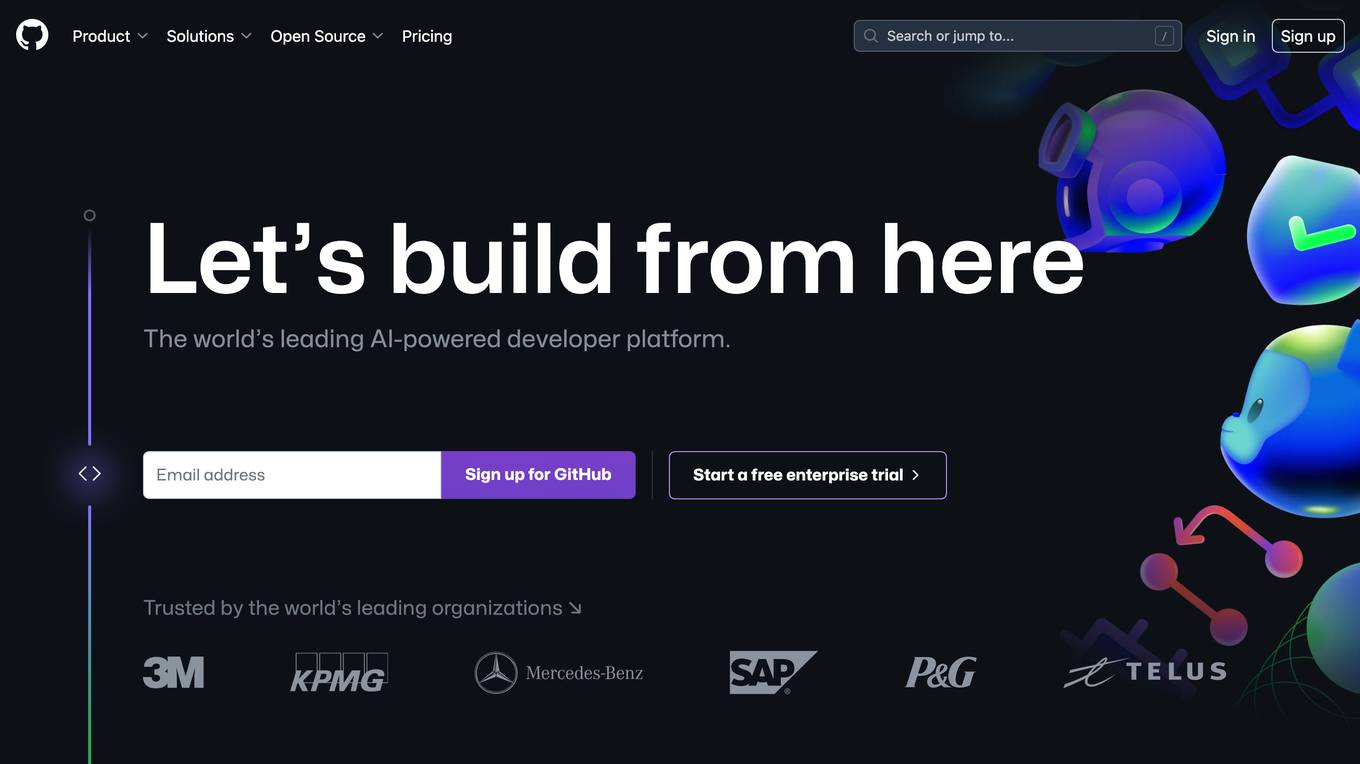
GitHub
GitHub is a collaborative platform that allows users to build and ship software efficiently. GitHub Copilot, an AI-powered tool, helps developers write better code by providing coding assistance, automating workflows, and enhancing security. The platform offers features such as instant dev environments, code review, code search, and collaboration tools. GitHub is widely used by enterprises, small and medium teams, startups, and nonprofits across various industries. It aims to simplify the development process, increase productivity, and improve the overall developer experience.
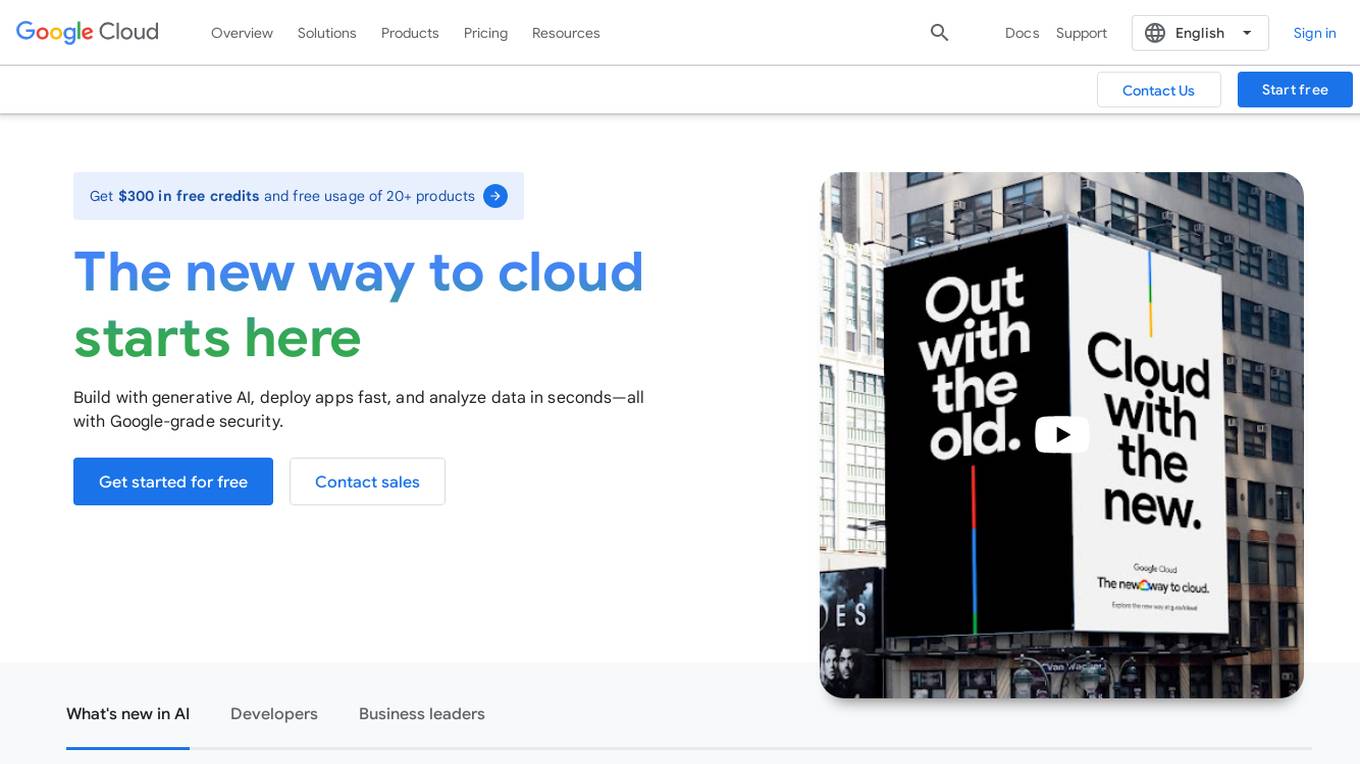
Google Cloud
Google Cloud is a suite of cloud computing services that runs on the same infrastructure as Google. Its services include computing, storage, networking, databases, machine learning, and more. Google Cloud is designed to make it easy for businesses to develop and deploy applications in the cloud. It offers a variety of tools and services to help businesses with everything from building and deploying applications to managing their infrastructure. Google Cloud is also committed to sustainability, and it has a number of programs in place to reduce its environmental impact.
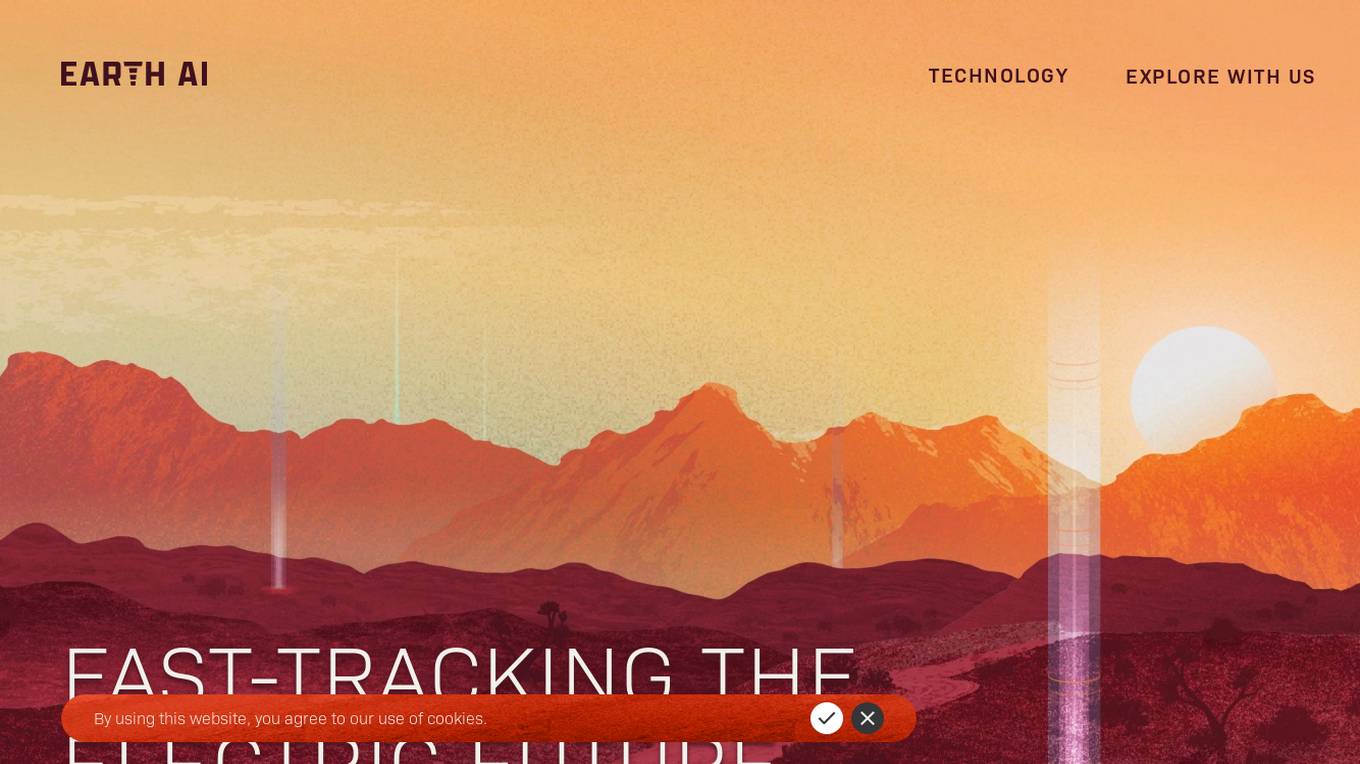
Earth AI
Earth AI is a high-performance explorer for clean energy minerals, utilizing artificial intelligence to discover untapped critical metal deposits at half the cost and in a fraction of the time. The company works with mineral resource companies to improve their odds of success while keeping costs low, offering accurate AI-driven prospect detection, modular hardware, and streamlined operations. Earth AI's revenue model is independent of service profits, and their process is four times faster than traditional methods. The company partners with explorers and development companies to bring discovered deposits into production.

Luma AI
Luma AI is an AI application that specializes in AI video generation using advanced models like Ray3 and Dream Machine. The platform aims to provide production-ready images and videos with precision, speed, and control. Luma AI focuses on building multimodal general intelligence to generate, understand, and operate in the physical world, catering to a new era of creativity and human expression.
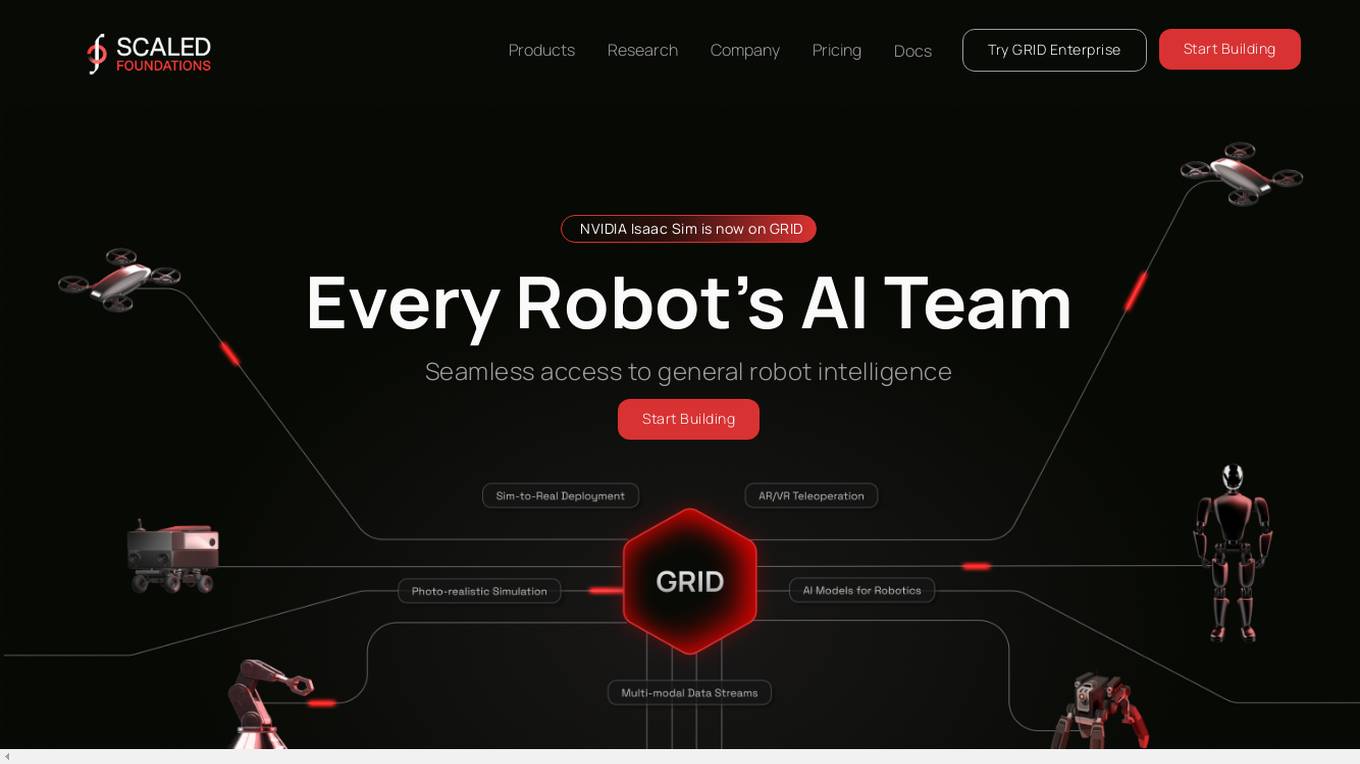
Scaled Foundations
Scaled Foundations is an AI application that offers a web-based platform for developing, training, validating, and deploying intelligent robots faster. It provides both Open GRID, a platform for general robot intelligence development, and GRID Enterprise, a packaged version for a scalable, customizable, and private robot training experience. The application aims to democratize advanced robot AI development by integrating technologies like Isaac Sim and AirSim, enabling users to accelerate their research and build robotic enterprises more efficiently.
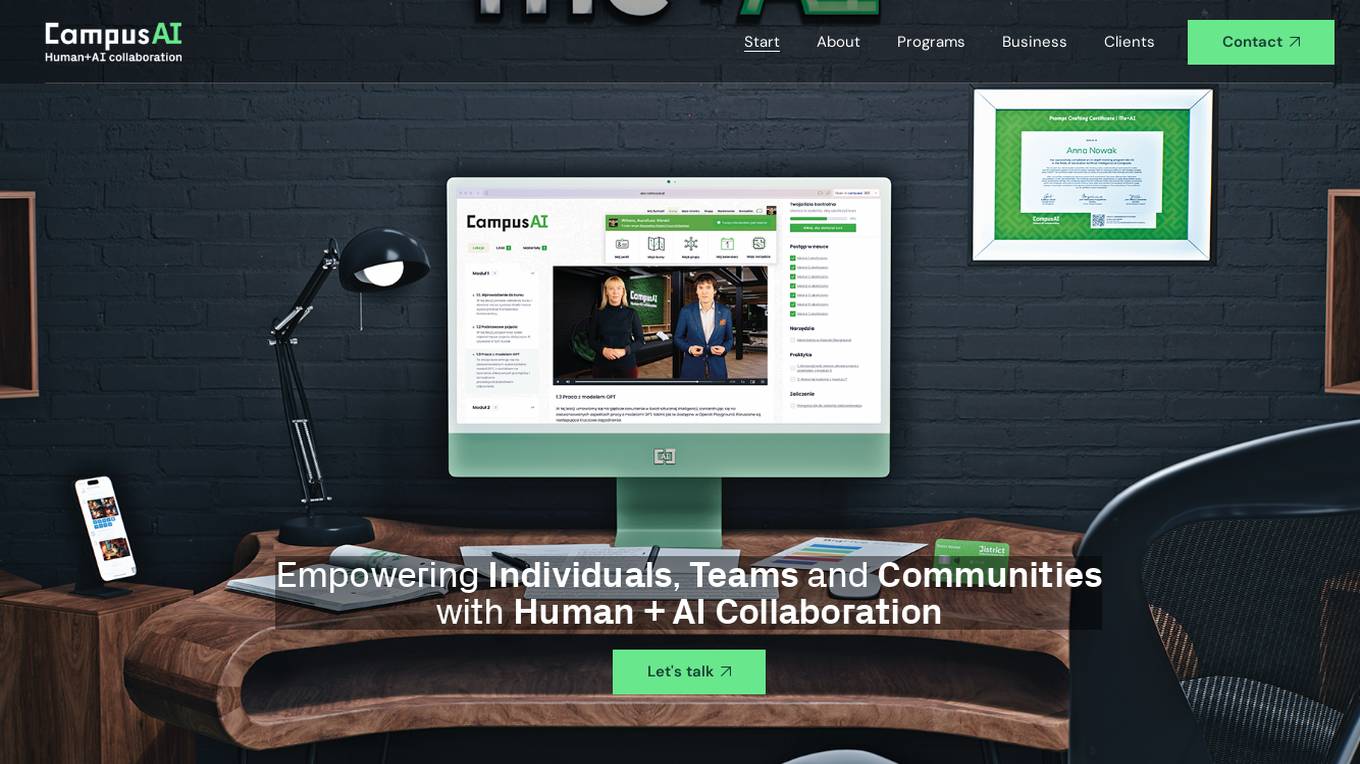
CampusAI
CampusAI is an AI-powered virtual platform that offers blended learning environments for individuals, teams, and communities. It provides interactive courses using avatar technology for beginners and a marketplace for advanced users to showcase expertise. For businesses, it supports digital transformation by enhancing employee skills with AI. The platform includes flagship courses, community programs, AI Gym for skill practice, AI Makerspace for project development, and AI District Club for resource exchange. CampusAI empowers users to collaborate with AI, gain valuable experience, and access cutting-edge tools and technologies.
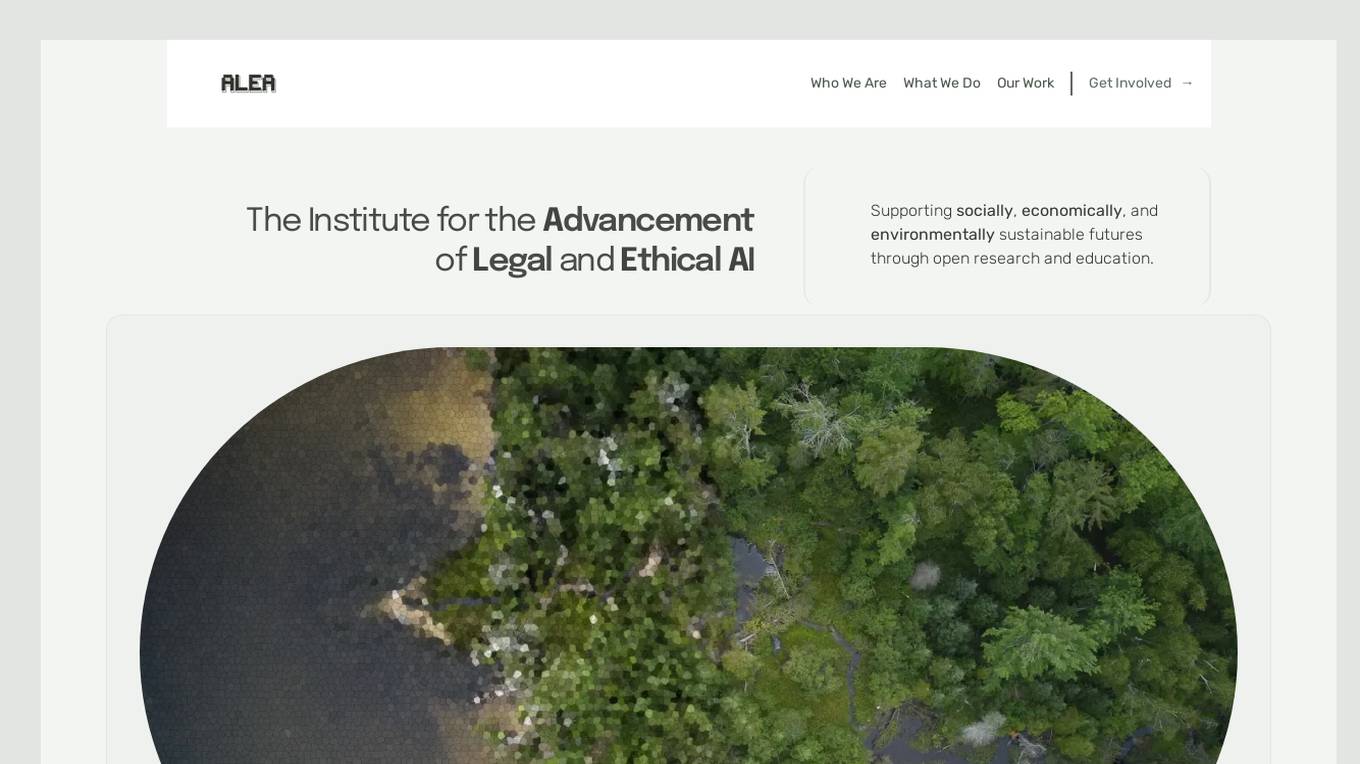
The Institute for the Advancement of Legal and Ethical AI (ALEA)
The Institute for the Advancement of Legal and Ethical AI (ALEA) is a platform dedicated to supporting socially, economically, and environmentally sustainable futures through open research and education. They focus on developing legal and ethical frameworks to ensure that AI systems benefit society while minimizing harm to the economy and the environment. ALEA engages in activities such as open data collection, model training, technical and policy research, education, and community building to promote the responsible use of AI.
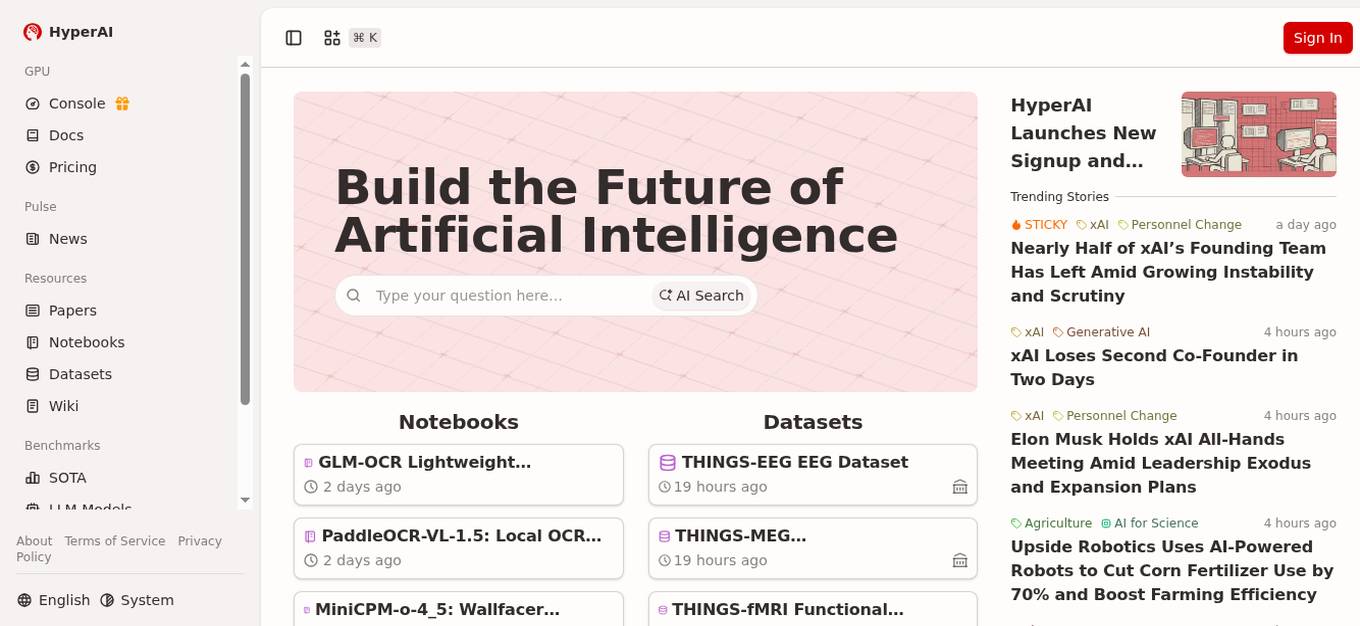
HyperAI
HyperAI is an advanced AI tool designed to accelerate AI development by providing a free AI co-coding environment, out-of-the-box solutions, and cost-effective GPU pricing. It offers cutting-edge AI research papers, benchmarks, and models to help users stay updated with the latest trends and advancements in the field of artificial intelligence.
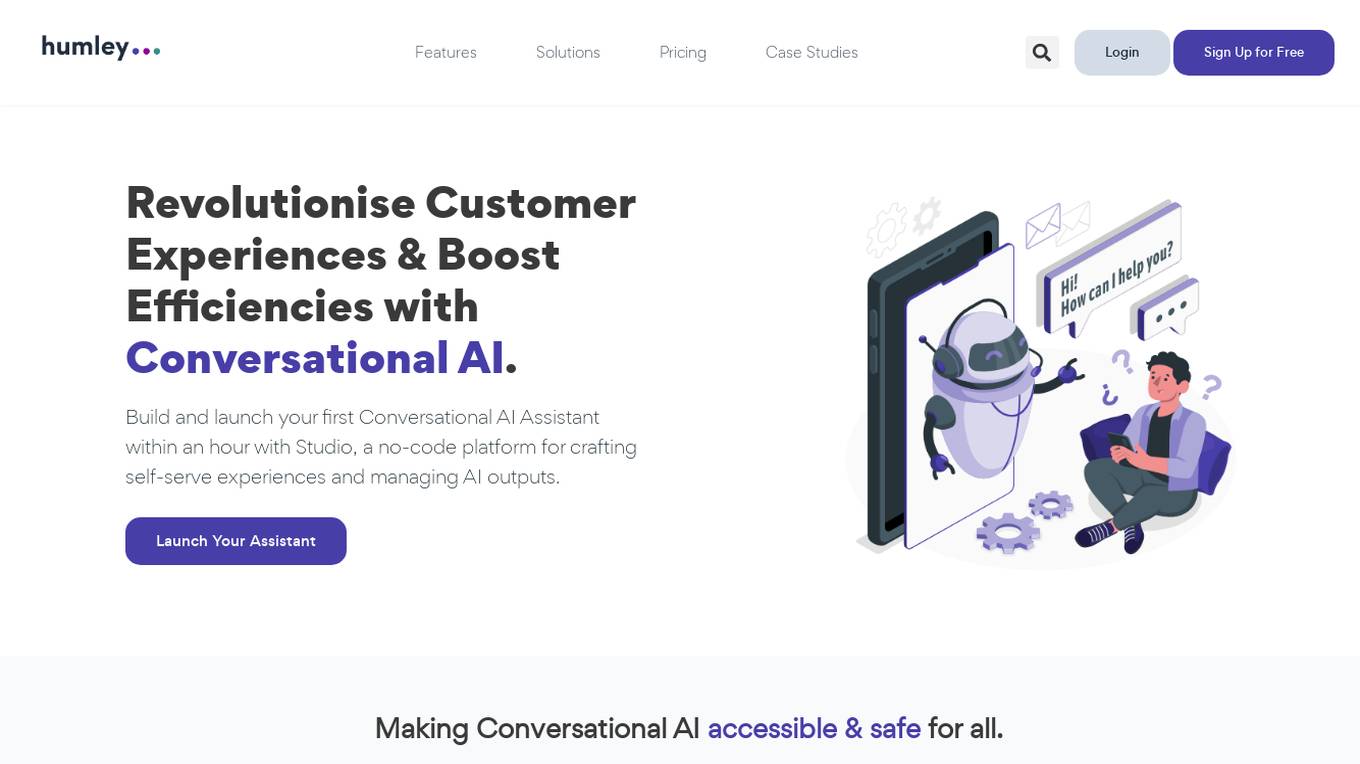
Humley
Humley is a Conversational AI platform that allows users to build and launch AI assistants in under an hour. The platform provides a no-code environment for creating self-serve experiences and managing AI outputs. Humley aims to revolutionize customer experiences and boost efficiencies by making Conversational AI accessible and safe for all users. With features like Knowledge Search, Build Flows, Integrate with Systems, Capture Feedback, and Multi-Channel Support, Humley Studio offers a comprehensive toolkit for creating engaging conversational experiences. The platform empowers businesses to deliver exceptional customer service, streamline access to AI models, and improve operational efficiencies.

Fe/male Switch
Fe/male Switch is a women-first startup game that offers a browser-based startup simulator experience. Players can assemble a team, create a startup with an investor and mentor, gain startup experience, win prizes, and get funded. The game aims to help individuals build their first startup, validate ideas, and overcome startup challenges. It provides a platform for aspiring entrepreneurs to test their entrepreneurial potential and learn essential business skills in a risk-free environment. Fe/male Switch features a unique Gamepreneurship methodology, AI co-founder support, and educational resources to guide players through the startup building process.
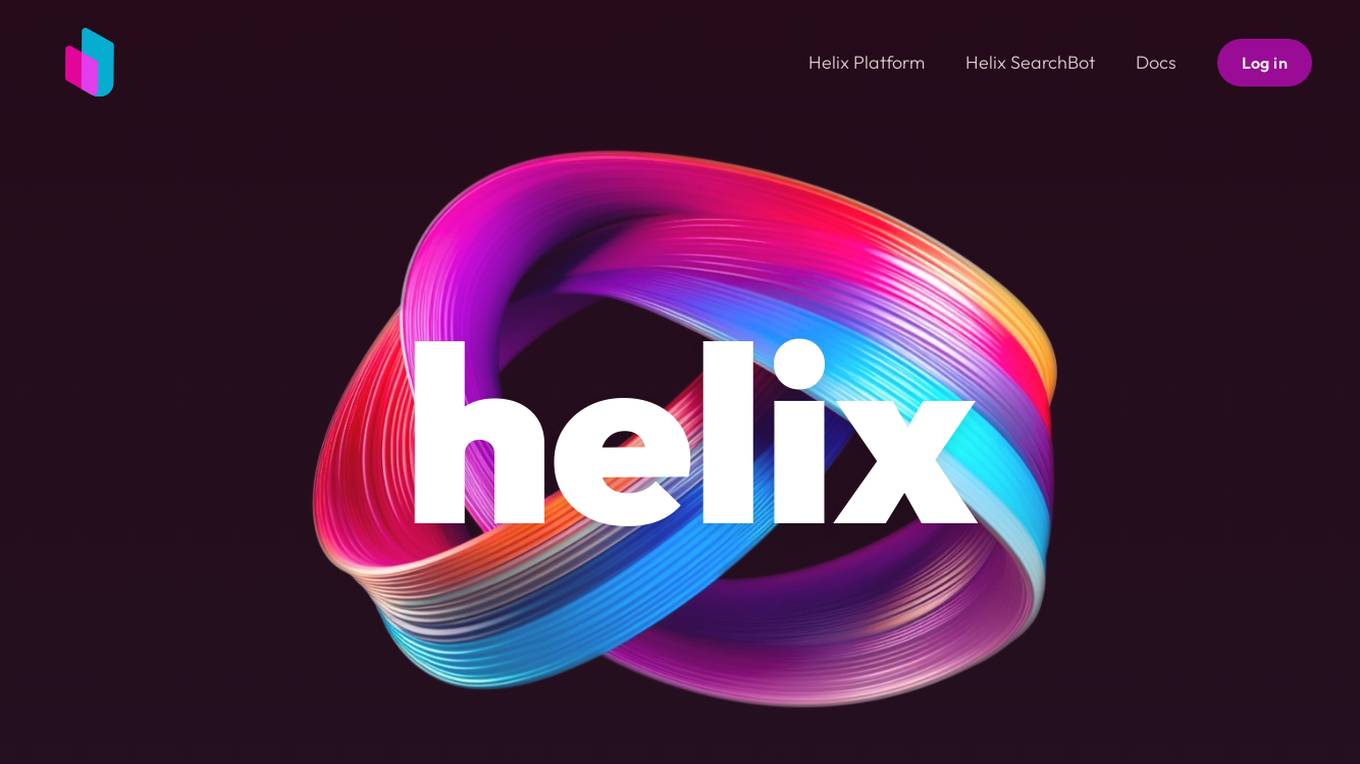
Helix AI
Helix AI is a private GenAI platform that enables users to build AI applications using open source models. The platform offers tools for RAG (Retrieval-Augmented Generation) and fine-tuning, allowing deployment on-premises or in a Virtual Private Cloud (VPC). Users can access curated models, utilize Helix API tools to connect internal and external APIs, embed Helix Assistants into websites/apps for chatbot functionality, write AI application logic in natural language, and benefit from the innovative RAG system for Q&A generation. Additionally, users can fine-tune models for domain-specific needs and deploy securely on Kubernetes or Docker in any cloud environment. Helix Cloud offers free and premium tiers with GPU priority, catering to individuals, students, educators, and companies of varying sizes.
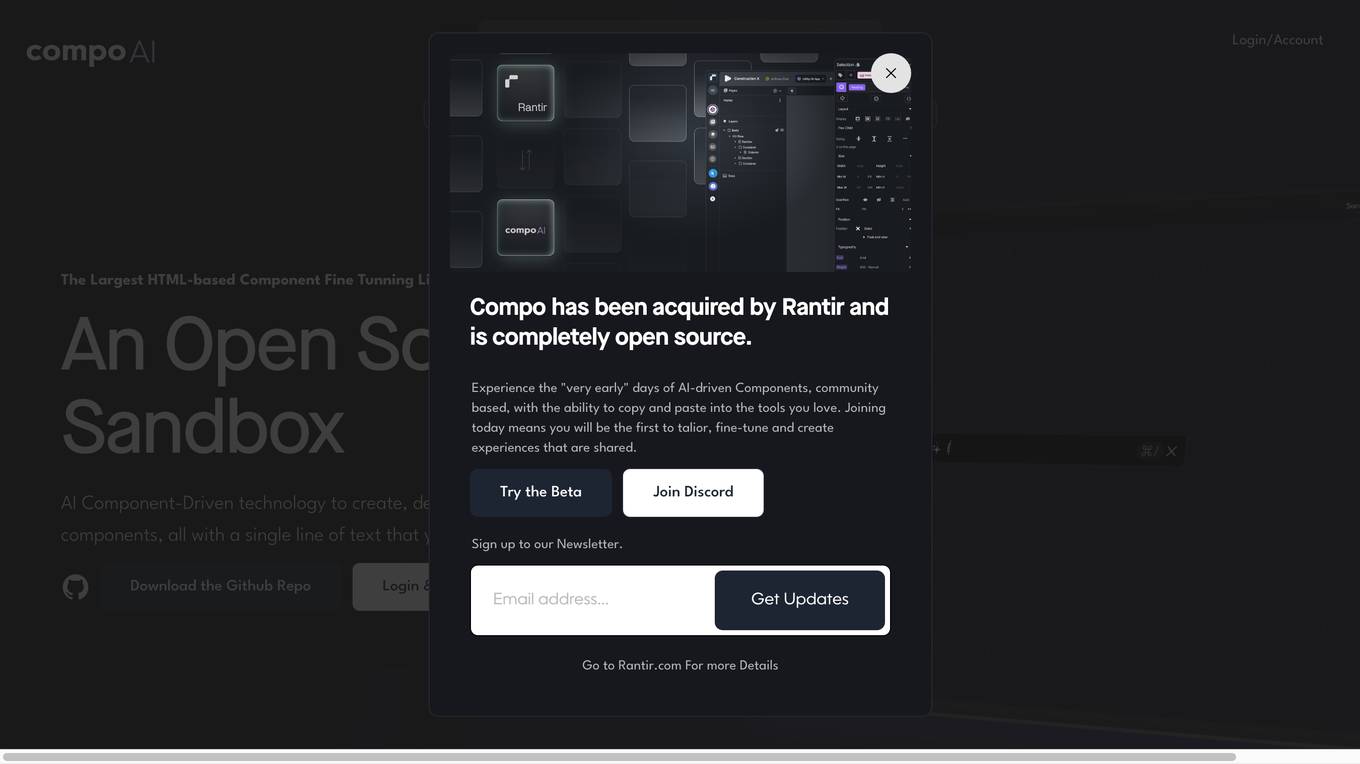
OpenResty
The website is currently displaying a '403 Forbidden' error, which means that access to the requested resource is forbidden. This error is typically caused by insufficient permissions or misconfiguration on the server side. The message 'openresty' suggests that the server is using the OpenResty web platform. OpenResty is a dynamic web platform based on NGINX and Lua that is commonly used for building high-performance web applications. It provides a powerful and flexible environment for developing and deploying web services.
2 - Open Source AI Tools
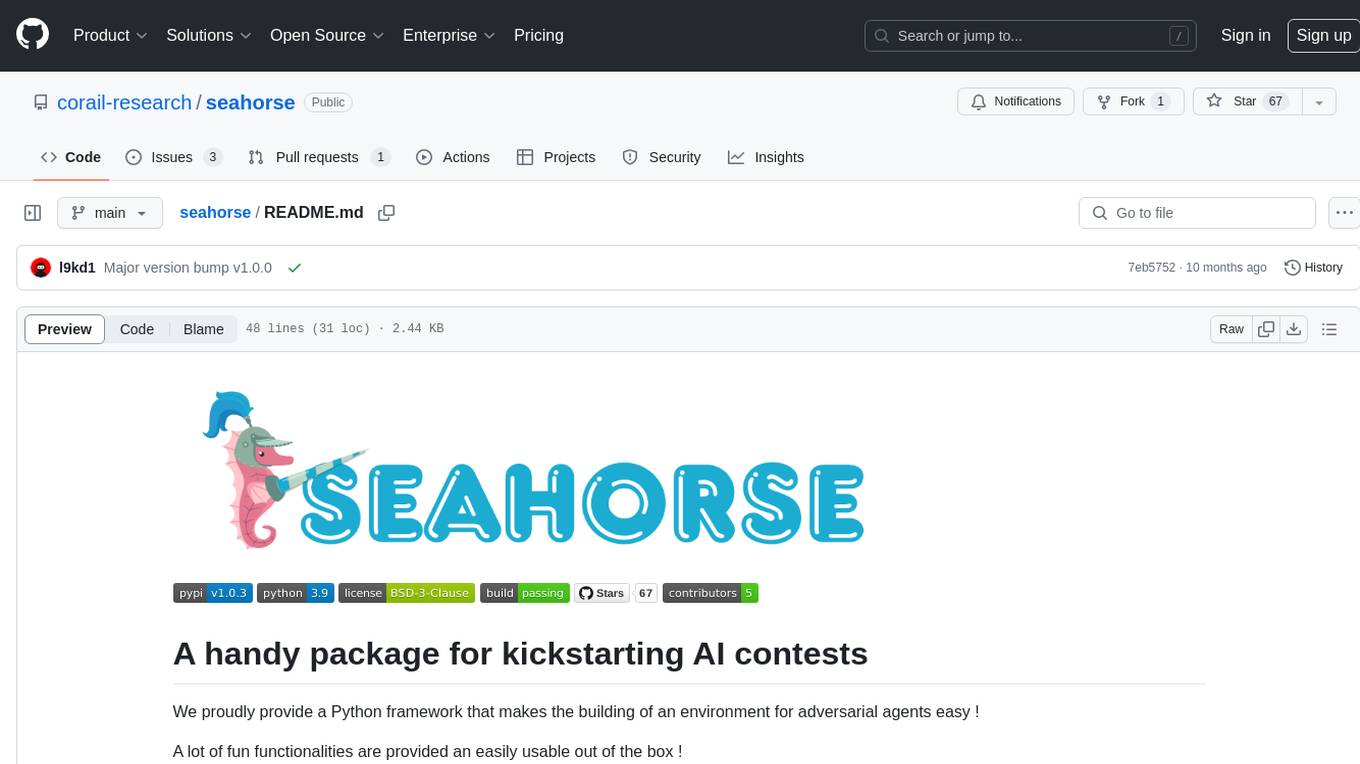
seahorse
A handy package for kickstarting AI contests. This Python framework simplifies the creation of an environment for adversarial agents, offering various functionalities for game setup, playing against remote agents, data generation, and contest organization. The package is user-friendly and provides easy-to-use features out of the box. Developed by an enthusiastic team of M.Sc candidates at Polytechnique Montréal, 'seahorse' is distributed under the 3-Clause BSD License.
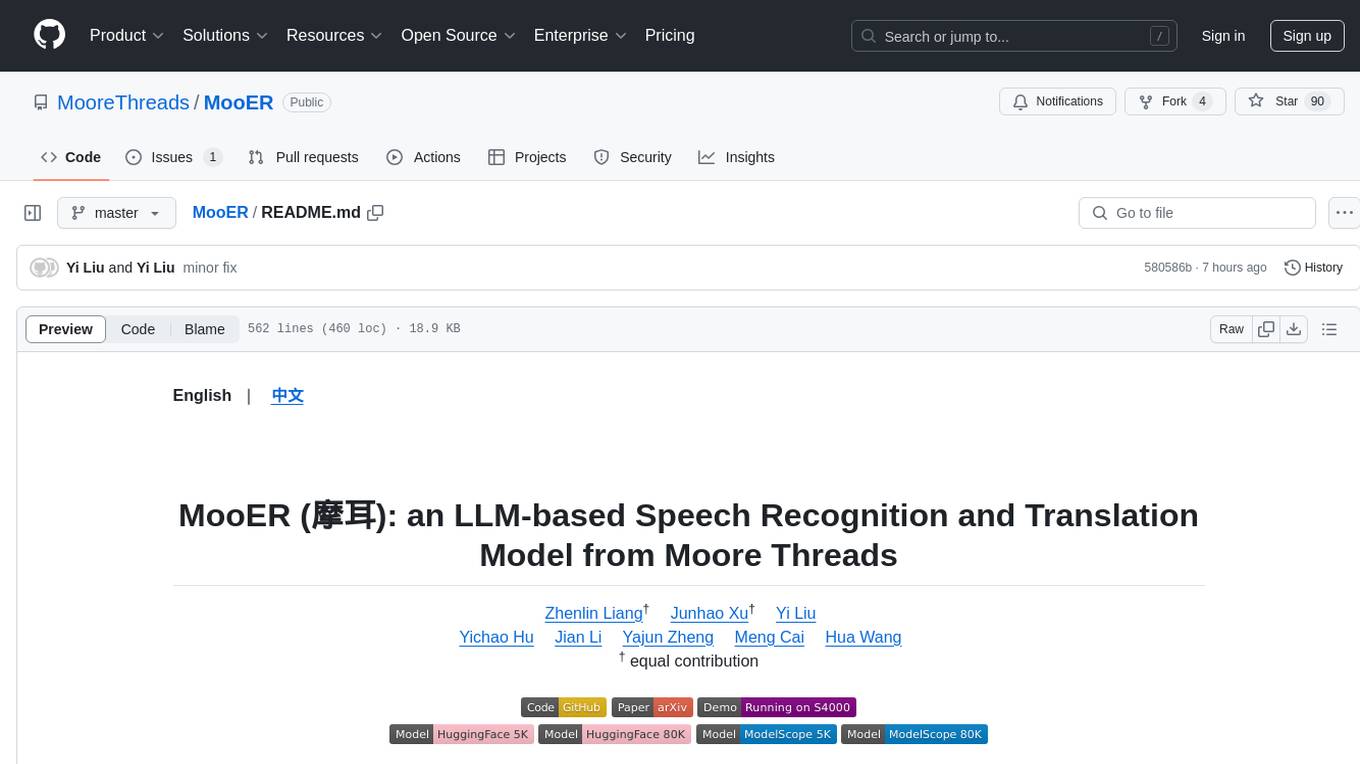
MooER
MooER (摩耳) is an LLM-based speech recognition and translation model developed by Moore Threads. It allows users to transcribe speech into text (ASR) and translate speech into other languages (AST) in an end-to-end manner. The model was trained using 5K hours of data and is now also available with an 80K hours version. MooER is the first LLM-based speech model trained and inferred using domestic GPUs. The repository includes pretrained models, inference code, and a Gradio demo for a better user experience.
20 - OpenAI Gpts

Unreal Engine Expert
Advanced guide in UE5 for experts, with a focus on advanced blueprints and optimization
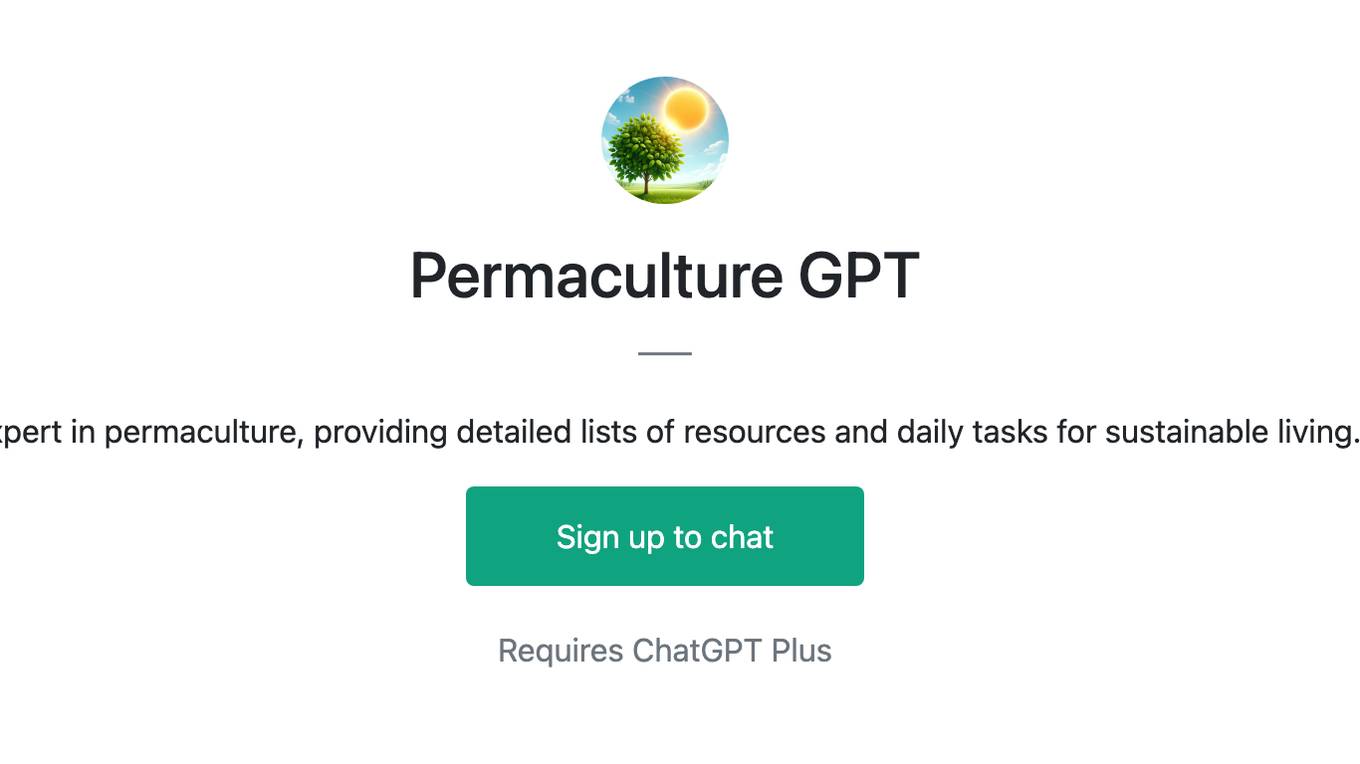
Permaculture GPT
Expert in permaculture, providing detailed lists of resources and daily tasks for sustainable living.
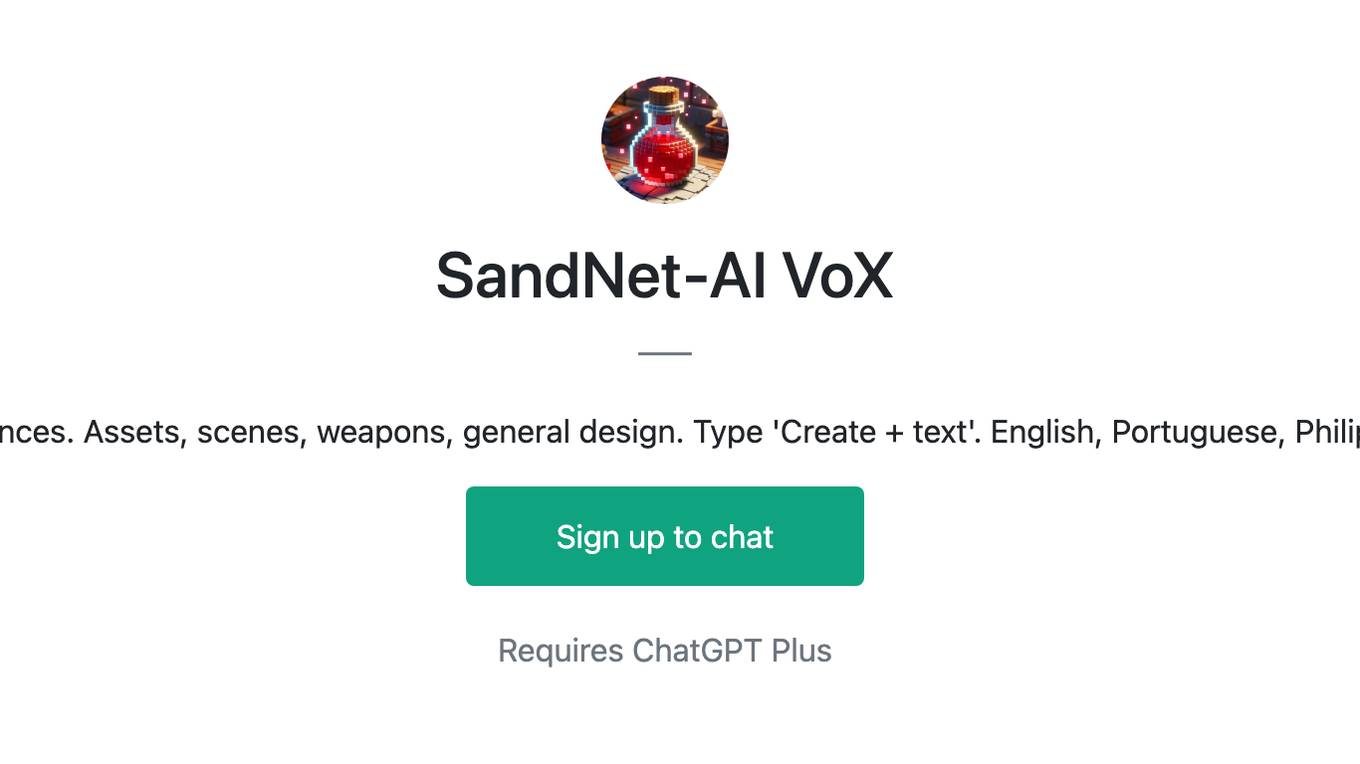
SandNet-AI VoX
Create voxel art references. Assets, scenes, weapons, general design. Type 'Create + text'. English, Portuguese, Philipines,..., +60 others.

Homestead Helper
Guiding in sustainable homesteading, self-sufficient living, and eco-friendly practices.
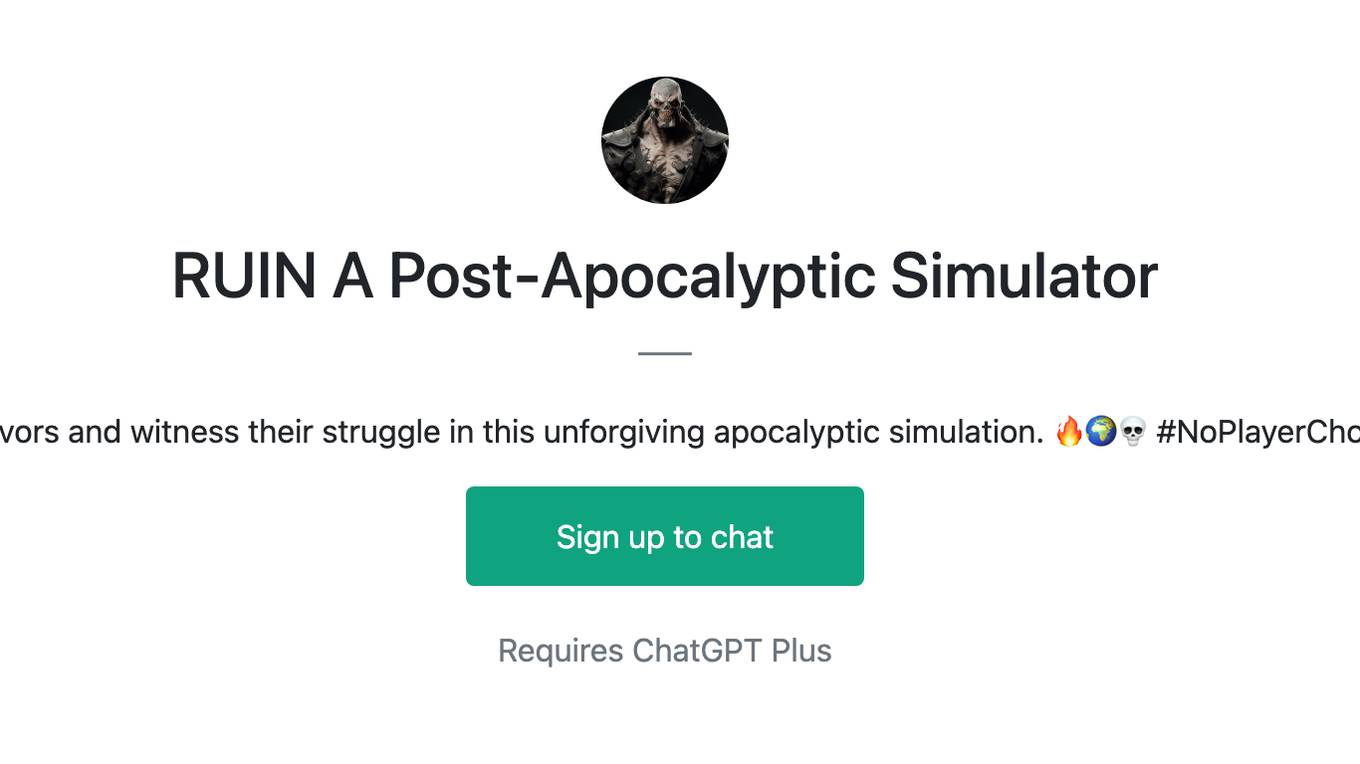
RUIN A Post-Apocalyptic Simulator
Craft two survivors and witness their struggle in this unforgiving apocalyptic simulation. 🔥🌍💀 #NoPlayerChoices (v.1.4.0)



